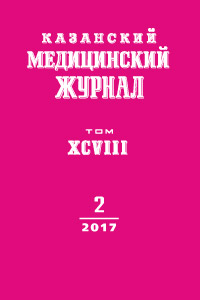Alcohol intoxication: evaluation of the population appealability and emergency medical care in Kazan
- Authors: Paykov VL1, Zamaleeva EI1, Zhukov DA1, Chernova OL2
-
Affiliations:
- Emergency Care Station
- Interregional Clinical Diagnostic Center
- Issue: Vol 98, No 2 (2017)
- Pages: 243-247
- Section: Social hygiene and healthcare management
- URL: https://kazanmedjournal.ru/kazanmedj/article/view/6220
- DOI: https://doi.org/10.17750/KMJ2017-243
- ID: 6220
Cite item
Full Text
Abstract
Aim. To study population appealability for emergency medical care with alcohol intoxication as well as the features of medical care service for them in Kazan at modern stage.
Methods. The data from emergency call cards from 2015 with the diagnosis «alcohol intoxication» (form No.11/u) were studied. A survey of 271 responders (medical personnel of mobile teams of emergency care and admission departments of the hospitals) of medical care service for people with alcohol intoxication in the streets was performed.
Results. In the structure of performed calls for adult popultion the ratio of patients who called an ambulance because of alcohol intoxication was 2.1% and because of the need for urgent care - 5.7%. Males were more prevalent than females: 82.1 and 17.9% respectively. Predominantly people younger than 60 years appealed: among males 82.7%, among females - 79%. Maximum appealability was registered in July (7.4 calls per 10 000 adults); during the week - on Saturday (11.9 per 10 000 adults), and during the day - during the period from 5 to 6 pm. The survey of the teams of ambulances and admission departments demonstrated the need for re-establishment of medical sobering-up stations (83.5 and 80% respectively) and more rarely the responders suggested development of specialized medical departments and active delivery of people with alcohol intoxication to specialized institutions involving law enforcement officials and personnel of specialized sobering-up stations (13 and 14.3% respectively).
Conclusion. In the structure of the calls performed by emergency care stations the ratio of patients who called an ambulance because of alcohol intoxication among adults was 2.1% and because of the need for urgent care - 5.7%; the appealability was affected by sex, age and calendar time; analysis of the survey results demonstrated the need for re-establishment of recently closed medical sobering-up stations and for development of specialized medical departments.
About the authors
V L Paykov
Emergency Care Station
Author for correspondence.
Email: pvl05@rambler.ru
Kazan, Russia
E I Zamaleeva
Emergency Care Station
Email: pvl05@rambler.ru
Kazan, Russia
D A Zhukov
Emergency Care Station
Email: pvl05@rambler.ru
Kazan, Russia
O L Chernova
Interregional Clinical Diagnostic Center
Email: pvl05@rambler.ru
Kazan, Russia
References
- Мирошниченко А.Г., Стожаров В.В., Барсукова И.М., Линец Ю.П. Скорая медицинская помощь в свете государственной программы развития здравоохранения Российской Федерации до 2020 года. Скорая мед. помощь. 2013; (2): 4-9.
- Пайков В.Л., Воронцова М.М. Оценка кратности обращений больных за скорой медицинской помощью. Казанский мед. ж. 2016; (3): 432-435. doi: 10.17750/KMJ2016-432.
- Пайков В.Л., Ишметов Р.П., Акчурина И.И. Причины непрофильной обращаемости взрослого городского населения за скорой медицинской помощью. Казанский мед. ж. 2015; (1): 105-108. doi: 10.17750/KMJ2015-105.
- Приказ МВД РФ от 23 декабря 2011 г. №1298 «Об утверждении Инструкции о порядке доставления лиц, находящихся в общественных местах в состоянии алкогольного, наркотического и иного токсического опьянения и утративших способность самостоятельного передвигаться или ориентироваться в окружающей обстановке, в медицинские организации». www.base.garant.ru70142982 (дата обращения: 10.09.2016).
Supplementary files







